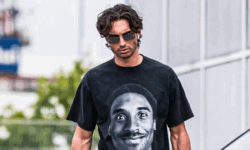
Born on May 30, 1976, in Filipstad, Sweden, Magnus Norman was introduced to tennis at the age of eight when his grandmother gifted him a racquet. Raised in a sports-oriented family—his father, Leif, played bandy in Sweden’s second division, and his mother, Leena, was a swimmer on the national team—Norman’s athletic prowess was evident early on. Initially, he played bandy, a sport he enjoyed during his youth before deciding to concentrate on tennis. His early exposure to sports laid the foundation for his future success on the tennis court. Wikipedia+1Wikipedia on IPFS+1
Professional Tennis Career
Magnus Norman turned professional in 1995 at the age of 19. He quickly made a name for himself on the ATP Tour, reaching a career-high singles ranking of world No. 2 on June 12, 2000. That year, he achieved significant milestones, including reaching the semifinals of the Australian Open, winning the Rome Masters, and finishing as the runner-up at the French Open, where he saved 10 championship points before losing to Gustavo Kuerten in a memorable final. Wikipedia+1Wikipedia on IPFS+1Wikipedia on IPFS
Norman’s playing style was characterized by aggressive baseline play, a powerful forehand, and a solid two-handed backhand. He was known for his work ethic, fitness, and mental toughness, which were evident in his performances on the court. Despite his potential, injuries, particularly to his hips and knees, led to his early retirement in 2004 at the age of 27. Over his career, he won 12 singles titles and earned over $4.5 million in prize money. Wikipedia
Transition to Coaching
After retiring from professional tennis, Norman took a brief hiatus from the sport. He later returned to tennis, driven by a desire to give back to the game. In 2008, he began coaching former doubles partner Thomas Johansson and also served as the coach of the Swedish Olympic Tennis Team. He guided Sweden to silver medals in men’s doubles at the Olympics. Between 2006 and 2008, Norman studied marketing and economics at IHM Business School in Stockholm and worked at Catella Fund Management. Wikipedia
In 2011, Norman co-founded the Good to Great Tennis Academy in Sweden with fellow former ATP pros Mikael Tillström and Nicklas Kulti. The academy has produced top-level talent, including Stan Wawrinka, Gaël Monfils, and Grigor Dimitrov. Under Norman’s guidance, Wawrinka won three Grand Slam titles—the 2014 Australian Open, the 2015 French Open, and the 2016 US Open—and reached a career-high No. 3 in the ATP rankings. For his achievements, Norman was awarded the ATP Coach of the Year in 2016. ATP Tour+1Wikipedia+1Wikipedia on IPFS+1Wikipedia+1ATP Tour+2Wikipedia+2Wikipedia on IPFS+2
Legacy and Impact
Magnus Norman’s journey from a promising tennis player to a respected coach exemplifies resilience and dedication. His ability to adapt and thrive in different roles within the tennis world has solidified his reputation as a key figure in the sport. Through his coaching, he has influenced the careers of several top players and continues to contribute to the development of tennis talent globally. Norman’s story is a testament to the enduring impact one individual can have on the world of sports.





